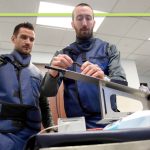How to Leverage IoT in Medical Device Manufacturing
In recent years, the Internet of Things (IoT) has taken the manufacturing industry by storm. Thanks to the intelligent systems that enable users to share data, access information and streamline various processes via cloud operating systems, manufacturing has become increasingly automated and optimized. The medical device manufacturing industry is no exception.
As engineers continue to learn how to make the most of IoT, the practice has become an industry standard. IoT is now regarded as a reliable method within the medical manufacturing industry, and developers are leveraging IoT to maximize the process of getting new devices to market. IoT in the healthcare industry is an innovator’s friend, and leveraging IoT in medical device manufacturing is essential for better practices, procedures and results. From initial brainstorming and ideation sessions to prototype development to finally putting a device into the hands of an end-user, IoT can improve the entire healthcare industry and make medical device manufacturing more effective.
1. Optimize Production Processes
IoT is an amalgam of integrated items that work together in a shared system. In the context of medical device manufacturing, this can drastically improve the development and production processes. IoT in the healthcare industry enables users to collaborate remotely, and share information quickly and securely. This allows for a designer in one part of the world to transfer files to an engineer in another part of the world in a matter of seconds or minutes.
Leveraging IoT in medical device manufacturing often comes in the form of automation. This has been successfully implemented in a few key applications already, notably through software development and quality assurance testing. Automation — whether it is in the form of robotic mechanics precisely putting together device components, or by alerting users to possible defects in a prototype — optimizes the entire medical device development process.
Thanks to the integration of IoT with existing processes, developers and engineers are able to complete more work and be more precise with their final product.
2. Leverage Data Analysis
Another benefit of IoT in the healthcare industry is the use of robust data analytics. Users suddenly have access to incredibly detailed data that can inform their development strategies and improve their product. With different connected devices and operating systems working at every stage of the development process, engineers can understand on a more micro level how the engineering techniques or development operations will be impacted.
These statistics and data can then be used to better inform later steps in the development process. Leveraging IoT in medical device manufacturing then improves the quality and efficiency of a project at the same time through precise measurements and more accurate readings of prototypes, materials and other machinery. Operating techniques such as 3D printing and laser cutting are just two examples of how development and engineering can be improved with the use of IoT in the healthcare industry.
3. Enhance Patient Care and Experience
Finally, leveraging IoT in medical device manufacturing can directly impact the end user experience, including for patients. Remote sensors, for example, can help track and treat patients who may not have direct, reliable access to a clinic. Wearable sensors and other remote patient monitoring capabilities rely on accurate and secure connections with clinics, hospitals and caregivers to deliver necessary care instructions and assistance.
IoT capabilities allow entrepreneurs, developers and caregivers to interact with patients on a remote basis with reliable connectivity and security. Monitoring capabilities and interactive features give patients more autonomy over their own care and improve the patient experience from the comfort of their own homes.
Thanks to the implementation of IoT in the healthcare industry, both patients and doctors are able to achieve their goals in a more comfortable and collaborative setting.
The Future of IoT in Healthcare
As IoT integration becomes more common and its capabilities demonstrate improvement among users in the healthcare manufacturing industry, the future of IoT will become even brighter and more essential. Engineers and developers have begun to see IoT as a standard practice in medical device manufacturing. Thanks to the optimization of procedures, the refinement of data analysis and improved patient care, medical device manufacturing is constantly at the forefront of breakthrough opportunities.
Leverage IoT in medical device manufacturing with engineers and developers who maintain a dedicated focus on learning and integrating new connected technologies every day. Nextern’s team of software engineers, medical device developers and user experience experts know how critical efficiency and quality are in the healthcare industry. We can partner with you to optimize your device and improve the quality of life for patients and caregivers around the world.
Contact our team to get started on developing a new kind of medical device.







